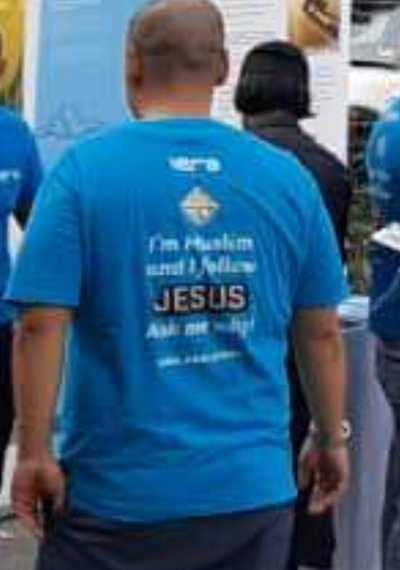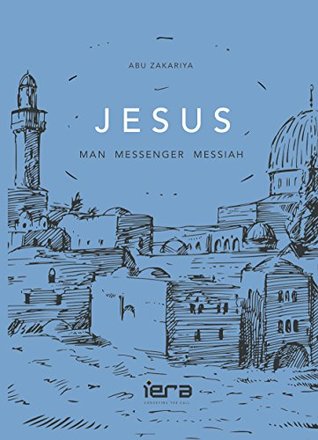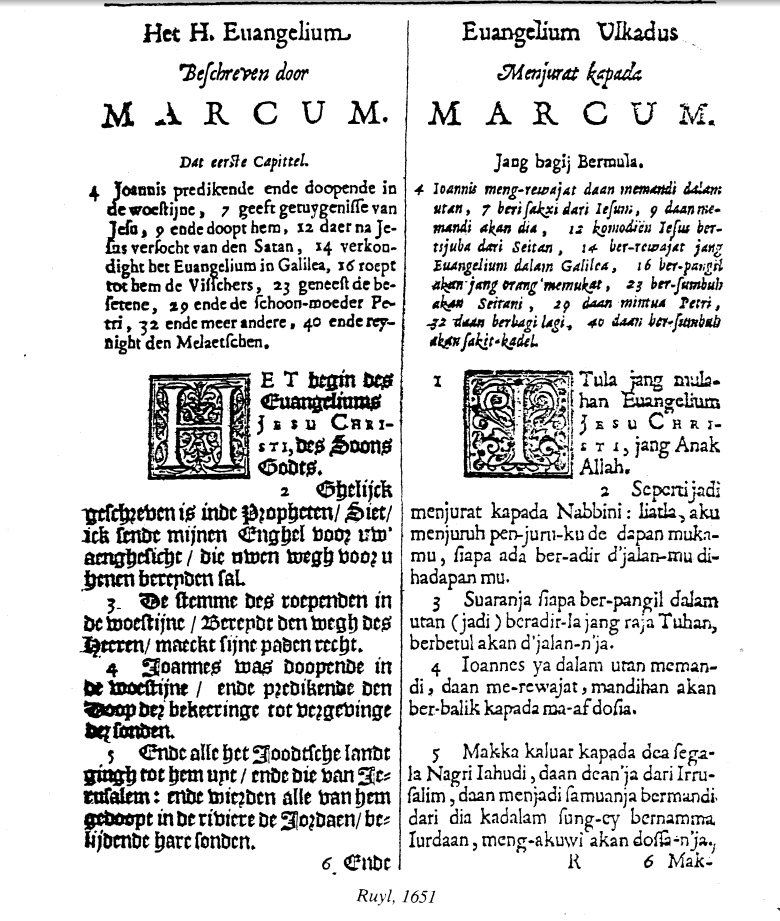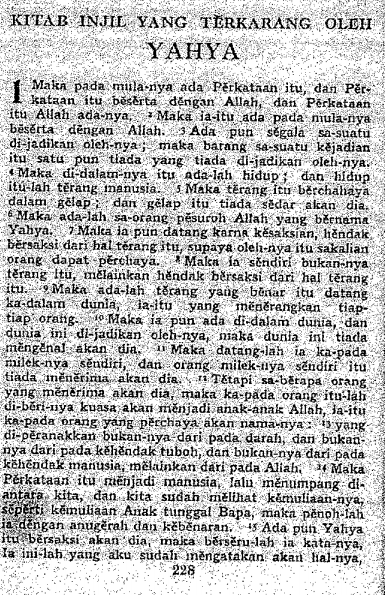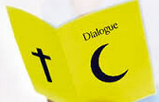Al-Quran menegaskan bahawa umat Islam yang awal percaya kepada apa yang diturunkan kepada Ahli Kitab – Al-Ankabut 29:46
[Believers], argue only in the best way with the People of the Book, except with those of them who act unjustly. Say, ‘We believe in what was revealed to us and in what was revealed to you; our God and your God are one [and the same]; we are devoted to Him.’ M.A.S. Abdel Haleem
And dispute ye not with the People of the Book, except with means better (than mere disputation), unless it be with those of them who inflict wrong (and injury): but say, “We believe in the revelation which has come down to us and in that which came down to you; Our Allah and your Allah is one; and it is to Him we bow (in Islam).” Yusuf Ali
Dan janganlah kamu berbahas dengan Ahli Kitab melainkan dengan cara yang lebih baik, kecuali orang-orang yang berlaku zalim di antara mereka; dan katakanlah (kepada mereka): “Kami beriman kepada (Al-Quran) yang diturunkan kepada kami dan kepada (Taurat dan Injil) yang diturunkan kepada kamu; dan Tuhan kami, juga Tuhan kamu, adalah Satu; dan kepadaNyalah, kami patuh dengan berserah diri.” http://www.iium.edu.my/deed/quran/malay/
Walau bagaimanapun, ramai orang Islam hari ini menolak pengajaran Alkitab kerana salah faham. Untuk menyelesaikan salah faham mereka, kami ingin menawarkan penerangan ringkas tentang kepercayaan Kristian seperti yang berikut:
SOALAN-SOALAN LAZIM (FAQ)
JAWAPAN KEPADA PERTANYAAN YANG SERING DIAJUKAN OLEH ORANG ISLAM
1. ‘Mengapa orang Kristian percaya kepada Tritunggal? Adakah kamu percaya kepada tiga tuhan?’
Orang Kristian tidak percaya kepada tiga tuhan! Kami percaya kepada Allah yang esa sahaja, sama seperti orang Muslim. Apabila kami berkata tentang Allah Bapa, Allah Anak dan Allah Roh Kudus, ia bukan merujuk kepda tiga tuhan yang berlainan. Seperti Islam, agama Kristian adalah agama tauhid. Istilah “Tritunggal” tidak terdapat di dalam Alkitab, tetapi idea itu diajar di dalam Alkitab.
2. ‘Mengapa kamu berkata bahawa Yesus itu “Anak Allah”?’
Kerana Yesus menyatakan dirinya sebagai ‘Anak’ dan memanggil Allah sebagai ‘Bapa’ dan ‘Bapa-Ku’. Kami tidak percaya Yesus adalah anak Allah hasil dari satu penyatuan fizikal. Idea seperti itu bertentangan dengan kepercayaan kami, sama seperti orang Islam.
Kami percaya bahawa ‘Allah itu Kasih’ di dalam persona-Nya, dan terdapat satu perhubungan kasih antara Allah Bapa, Allah Anak dan Allah Roh Kudus, bahkan sebelum dunia ini dicipta. Yesus adalah lebih daripada seorang nabi, kerana Dia adalah 100% manusia dan 100% Allah pada masa yang sama. Apabila kami merujuk kepada Yesus sebagai Anak Allah, itu adalah satu istilah yang paling mudah untuk menyatakan bahawa Yesus sama seperti Allah, dan ini tidak pernah dan tidak akan berlaku kepada mana-mana manusia lain. Apabila kita menujukan pandangan kepada Yesus, kita mempunyai satu idea tentang Allah.
3. ‘Mengapa kamu percaya Yesus disalib?’
Kerana itu yang diajar oleh Kitab Suci. Perjanjian Baru menyatakan bukan kerana kelemahan Allah yang menyebabkan Yesus disalib, tetapi itu adalah cara-Nya untuk menunjukkan kejahatan sifat manusia yang sebenar. Tetapi ia juga adalah cara Allah menunjukkan betapa besar kasih-Nya terhadap manusia kerana ingin mengampuni dosa kita. Orang Kristian melihat penyaliban Yesus sebagai satu ‘korban untuk penebusan dosa’ yang terakhir dan sempurna, sehingga tidak memerlukan korban lain yang selanjutnya. Allah membenarkan Yesus untuk mati kerana semua manusia akan mati apabila tiba waktunya. Tetapi dengan membangkitkan Yesus semula, Allah bukan sahaja menampakkan diri dan identiti sebenar Yesus, tetapi juga memusnahkan kuasa kematian untuk selama-lamanya bagi mereka yang percaya kepada Yesus.
4. ‘Alkitab kamu telah dipalsukan.’
Saya tahu ini adalah yang telah diajarkan kepada anda untuk sekian lama. Tetapi adakah anda pernah membaca Alkitab? Menurut Al-Quran, mesej yang diturunkan oleh Allah kepada Nabi Muhammad mengesahkan Kitab-Kitab Suci yang terdahulu – Taurat Musa, Zabur Daud, dan Injil Yesus. Jika semua Kitab Suci tersebut yang berada di dalam tangan kaum Yahudi dan Kristian pada zaman Nabi Muhammad telah dipalsukan, bagaimanakah Al-Quran boleh mengesahkan Kitab-Kitab Suci yang dinyatakan? Bolehkah anda memberitahu saya siapa yang memalsukan Kitab-Kitab Suci tersebut, dan bilakah ia berlaku? Mahukah anda membaca riwayat Yesus yang terdapat di dalam Injil kami? Bagaimana anda boleh mendakwa bahawa Alkitab telah dipalsukan kalau anda sendiri tidak pernah membacanya?
5. ‘Alkitab penuh dengan kesilapan dan percanggahan.’
Orang Kristian tahu tentang percanggahan yang anda dapati di dalam Alkitab kerana cendekiawan Kristian telah lama mengetahui hal tersebut. Tetapi cendekiawan Kristian mempunyai cara sendiri untuk menerangkan perkara tersebut, malah kebanyakannya boleh diterangkan dengan mudah. Yang lain memerlukan tafsiran yang lebih mendalam lagi. Adakah anda sedia untuk mendengar penjelasan kami?
Sebenarnya ini juga boleh berlaku kepada anda. Ada orang Kristian yang mengatakan bahawa ada banyak percanggahan di dalam Al-Quran. Bagaimanakah perasaan anda jika saya mengkritik Al-Quran? Tetapi saya tidak mahu melakukan itu kerana saya tidak berminat untuk mengkritik Al-Quran. Jika orang Islam tidak suka orang Kristian mengkritik Al-Quran, mengapakah orang Islam berbuat demikian terhadap Alkitab?
Anda mempunyai masalah dengan percanggahan di dalam Alkitab kerana anda membuat perbandingan di antara Alkitab dengan Al-Quran. Anda percaya bahawa Al-Quran telah diturunkan kepada Nabi Muhammad secara langsung, dan mengandaikan Injil juga sedemikian. Orang Kristian percaya bahawa Alkitab adalah Firman Allah, dan melalui Roh Kudus Allah telah mengilhami para penulis untuk menulis kitab-kitab di dalam Alkitab. Tetapi Firman Allah di dalam Alkitab ditulis oleh ramai penulis. Jadi bagi orang Kristian, Alkitab adalah Firman Allah dan juga perkataan manusia. Masalah asas di antara kita berdua adalah kita mempunyai pandangan yang berbeza tentang cara Firman Allah diturunkan kepada manusia. Orang Islam percaya bahawa wahyu teragung daripada Allah diturunkan di dalam bentuk sebuah buku, iaitu Al-Quran. Tetapi bagi orang Kristian, kami percaya bahawa wahyu teragung diturunkan melalui satu peribadi, iaitu Yesus.
6. ‘Kami percaya bahawa Yesus seorang nabi. Mengapakah kamu tidak percaya bahawa Muhammad juga seorang nabi’
Kalau kami mengiktiraf Muhammad sebagai seorang nabi seperti umat Islam, maka kami semua menjadi Muslim. Kami dengan sukacitanya menerima ajaran daripada Al-Quran bahawa Allah itu Esa, sama seperti yang diajar di dalam Alkitab. Tetapi kami tidak percaya pada seluruh Al-Quran kerana pengajarannya berbeza dan bercanggah dengan ajaran di dalam Kitab Suci kami.
Kami percaya bahawa Yesus adalah nabi yang terakhir, Kalimahtullah yang terunggul dan terakhir untuk seluruh dunia. Yesus adalah wahyu Allah yang sempurna dan lengkap di dalam bentuk manusia, dan kami tidak percaya bahawa terdapat wahyu yang lebih sempurna tentang Allah selepas Yesus.
7. ‘Mengapa kamu tidak percaya bahawa Alkitab bernubuat tentang kedatangan Muhammad?’
Ada dua ayat Alkitab yang sering dipetik untuk menyampaikan idea tersebut. Yang pertama dipetik daripada kitab Ulangan, di mana terdapat nubuatan tentang seorang nabi yang akan datang: ‘Seorang nabi dari tengah-tengahmu, dari antara saudara-saudaramu, sama seperti aku, akan dibangkitkan bagimu oleh TUHAN, Allahmu; dialah yang harus kamu dengarkan.’ (Ulangan 18:15). Ini tidak mungkin merujuk kepada Muhammad kerana Musa berkata nabi tersebut akan datang ‘dari antara saudara-saudaramu’, iaitu dari bani Israel.
Ayat kedua adalah pernyataan Yesus tentang kedatangan seorang Paraclete: ‘Aku akan minta kepada Bapa, dan Dia akan memberikan kepadamu seorang Penolong yang lain, supaya Dia menyertai kamu selama-lamanya.’ (Yohanes 14:16; sila rujuk juga kepada 14:26, 15:26, 16:7). Orang Kristian sentiasa mentafsirkan kata-kata Yesus ini tentang kedatangan Roh Kudus. Yesus tidak pernah bercakap tentang seorang nabi yang akan datang selepas Dia.
Sumber: Colin Chapman, The Cross and the Crescent IVP Books 2008.
Artikel Berkaitan – FAQ: JAWAPAN KEPADA SOALAN-SOALAN ORANG ISLAM
